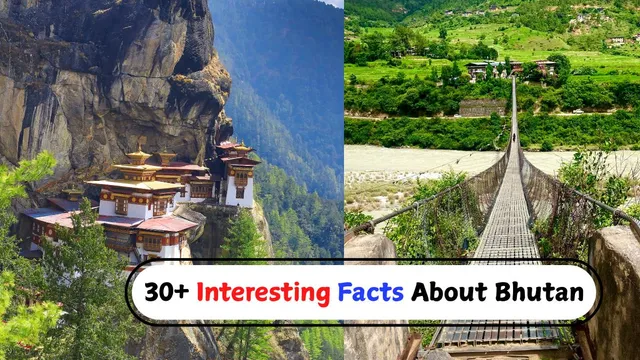- By Aditi Priya Singh
- Wed, 12 Nov 2025 12:05 PM (IST)
- Source:JND
30+ Interesting facts about Bhutan: Nestled in the Eastern Himalayas, Bhutan is a small yet fascinating country known for its natural beauty, spiritual culture, and focus on happiness rather than wealth. Surrounded by India and China, Bhutan is often called the “Land of the Thunder Dragon” for its majestic landscapes and deep-rooted Buddhist traditions. Despite being one of the smallest countries in Asia, it has managed to preserve its identity, culture, and environment uniquely.
The country prioritises Gross National Happiness (GNH) over GDP, believing that well-being is more important than economic growth. Bhutan’s policies are built around harmony with nature, making it the only carbon-negative country in the world. From its breathtaking monasteries and high mountain passes to its eco-friendly lifestyle and strong monarchy, Bhutan continues to charm the world with its simplicity and wisdom.
Let’s explore 35 interesting facts about Bhutan, a country where happiness truly comes before everything else.
Bhutan’s Geography and Nature
-1762929204639.jpg) Interesting Facts about Bhutan (Image: Canva)
Interesting Facts about Bhutan (Image: Canva)
1. Bhutan is a landlocked country situated high in the Eastern Himalayas, bordered by India and China.
2. Over 70% of Bhutan's land is covered by forests, a ratio mandated by its constitution.
3. Bhutan is the only country in the world that is carbon-negative, absorbing more CO2 than it emits.
4. The use of plastic bags has been banned in the country since 1999 to protect the environment.
5. Gangkhar Puensum peak is Bhutan's highest and is considered the highest unclimbed mountain in the world due to a religious climbing ban.
Culture and Traditions of Bhutan
6. The Official Religion of Bhutan is Vajrayana Buddhism (specifically the Drukpa Kagyu school) is the official state religion, deeply influencing all aspects of life.
7. Most homes feature a small shrine or altar for daily offerings and prayers.
8. Traditional Dress of Bhutan: Citizens wear the national dress daily: the knee-length robe Gho for men and the ankle-length Kira for women.
9. The National Sport of Bhutan is Archery(Bow to shoot arrows), played in a highly social, competitive, and ritualistic manner.
10. The country celebrates vibrant annual Tshechus—religious festivals featuring elaborate masked dances (chams).
ALSO READ: Which Country Invented Chess? Discover An Interesting Fun Fact About The Game
Government and Leadership In Bhutan
11. Bhutan transitioned from an absolute monarchy to a democratic constitutional monarchy in 2008.
12. The current monarch, King Jigme Khesar Namgyel Wangchuck, is widely revered and affectionately known as the "People's King."
13. National success is measured by Gross National Happiness (GNH), which prioritises collective well-being over economic growth (GDP). GNH is measured by four main pillars: sustainable and equitable socio-economic development, environmental conservation, preservation and promotion of culture, and good governance.
Recommended For You
14. Bhutan held its first parliamentary election in 2008, a transition initiated voluntarily by the monarchy.
15. The institution of the monarchy holds deep respect and love among the Bhutanese citizens.
Environment and Lifestyle In Bhutan, India’s peaceful neighbour
-1762929248793.jpg) Interesting Facts about Bhutan (Image: Canva)
Interesting Facts about Bhutan (Image: Canva)
16. Tobacco Restriction: The sale and consumption of tobacco are heavily restricted, with the sale of tobacco products being banned.
17. Reforestation Rule: Environmental rules often dictate that new trees must be planted to replace any that are cut down.
18. The government provides free and comprehensive education and healthcare to all citizens.
19. Organic Agriculture: Agriculture is primarily organic, with the government aiming for a 100% chemical-free farming system.
20. Tourists must pay a daily Sustainable Development Fee (SDF), a policy designed to promote "High Value, Low Impact" tourism.
Tourism and Attractions in Bhutan
-1762929301526.jpg) Interesting Facts about Bhutan (Image: Canva)
Interesting Facts about Bhutan (Image: Canva)
21. Paro Taktsang (Tiger's Nest Monastery) is the most iconic cultural site, clinging precariously to a cliff face.
22. No Traffic Lights: The capital city, Thimphu, is famously the only capital in the world without a single traffic signal (it briefly had one, but it was removed).
23. Bhutan has actively avoided global modern architecture, having no skyscrapers or international fast-food chains like McDonald’s.
24. Punakha Dzong, known as "the palace of great happiness," is considered one of the most beautiful and architecturally stunning fortresses in the country.
25. The country only opened its doors to foreign tourists in 1974 and still strictly controls visitor numbers.
Education and Society Culture in Bhutan
26. Free Education: The government ensures that education is provided completely free of charge to all citizens from primary to higher levels.
27. English is widely used as the main medium of instruction in schools, alongside the national language, Dzongkha.
28. Literacy Growth: Bhutan has seen a significant and steady rise in its national literacy rate since the 1980s.
29. Traditional Arts: Youth are actively encouraged to preserve and learn the thirteen traditional arts and crafts (Zorig Chusum).
30. The education system promotes mindfulness, meditation, and spiritual values as core components of a GNH-based curriculum.
Unique Facts About Bhutan
31. Late Media Adoption: Television and the Internet were only introduced in 1999, making Bhutan one of the last countries to adopt them.
32. GNH vs. GDP: Bhutan uniquely measures its national success not by GDP (economic output) but by Gross National Happiness (holistic well-being).
33. Traffic Management: Even the capital operates traffic control without traffic signals, relying on a policeman's manual directions.
34. Value System: The country deliberately limits the pace of Western-style modernisation to ensure the preservation of its culture and natural environment.
35. Public Smoking Ban: Smoking in public places is strictly prohibited, a testament to the nation's commitment to public health.


-1762924257426_m.webp)


